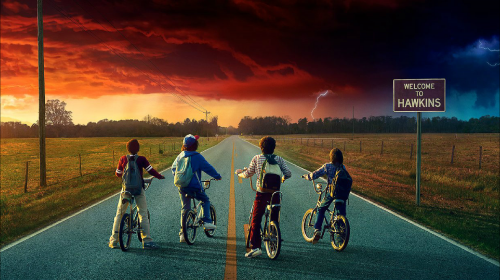
This story is part of a group of stories called

Uncovering and explaining how our digital world is changing — and changing us.
Netflix started out shipping DVDs to customers through the mail. Then it started streaming other people’s movies and TV shows. Then it started making its own movies and TV shows. Next up: Video games.
On Tuesday, Netflix formally told investors that is in the “early stages of further expanding into games,” saying that it’s an extension of experiments the company has done with a handful of choose-your-own-adventure-style interactive programs, like 2018’s Bandersnatch.
It’s a move that is both obvious and surprising, and we’ll discuss why in a minute. First, here’s how Netflix says it will work:
- The games will be bundled for free into Netflix’s main app, and for the time being, will be primarily meant to be played on mobile devices, though they may eventually migrate to TVs.
- The company thinks some of its games will connect in some way to Netflix-owned franchises — you can definitely imagine a Stranger Things game, though probably not a Sex/Life one — but it may also license existing games and brands from other developers.
- Netflix is describing its move into games as an initial foray — “We think the time is right to learn more about how our members value games,” the company said in its quarterly earnings release — but also says it expects to be in gaming for the long haul. “This is a core part of our subscription offering,” Greg Peters, the company’s chief operating officer, said during the company’s earnings call.
- The company thinks the main value of its games will be in keeping existing subscribers more engaged in the Netflix app, and thus less likely to unsubscribe. The games could also, in theory, help drive new subscriptions.
If you have paid attention to Netflix over the years, you have seen this move coming: Netflix executives, starting with CEO Reed Hastings, have mused for years about the fact that games are a major source of competition for Netflix users’ time and money. More concretely, the Information reported earlier this spring that the company was considering offering a bundle of games to subscribers, similar to the ones Apple offers via its Apple Arcade service. And last week, Bloomberg reported that Netflix had hired an executive to run its upcoming games service.
On the other hand: If you’ve paid attention to Netflix over the years, you may also view this as a real departure from the company’s strategy — namely, from its insistence on focusing on doing one thing well.
For years, Netflix executives have been asked when they will get into live sports or live news, or when they will add advertising to the service. The response is always the same: Netflix thinks a single-minded focus is the best way to win, and branching out beyond on-demand movies and TV shows would be a distraction.
Now, the company says, it’s willing to try something new, while arguing that free games are a reasonable extension of what it’s already doing. The company’s subscription model means “we don’t have to think about ads [in games]. We don’t have to think about in-game purchases or other monetization; we don’t have to think about per-title purchases,” Peters said during the earnings call.
Yes, Netflix allows, it doesn’t really know anything about making and hosting video games. But it says it didn’t know anything about making its own content when it agreed to make House of Cards in 2011, and that has worked out fine since.
But that seems like a stretch. When Netflix tells the story about its first move into original content, it said that it thought its customers would like House of Cards because it knew its customers like other dark political soap operas. And while Netflix didn’t know anything about making shows when it started 10 years ago, it didn’t really have to know that: It simply paid David Fincher, Kevin Spacey, and production company Media Rights Capital to make the show — and then it streamed it to customers the same way it streamed the other shows and movies it already had.
But figuring out how to make games is a very different skill set than making TV shows and movies — which is why most big entertainment companies have failed whenever they’ve tried to get into games themselves (big tech companies like Amazon, Apple, and Google have all swung and missed to varying degrees, as well). So it’s entirely possible that Netflix’s move into games could flop, too.
On the other hand: As even the most hidebound Hollywood executive knows by now, games are bigger than Hollywood, and they’re not going away. If it’s going to take a long time to figure out, it’s better to get started sooner than later.
Will you support Vox’s explanatory journalism?
Millions turn to Vox to understand what’s happening in the news. Our mission has never been more vital than it is in this moment: to empower through understanding. Financial contributions from our readers are a critical part of supporting our resource-intensive work and help us keep our journalism free for all. Please consider making a contribution to Vox today from as little as $3.
Sourse: vox.com


